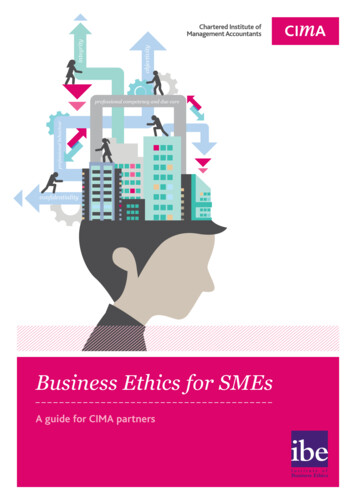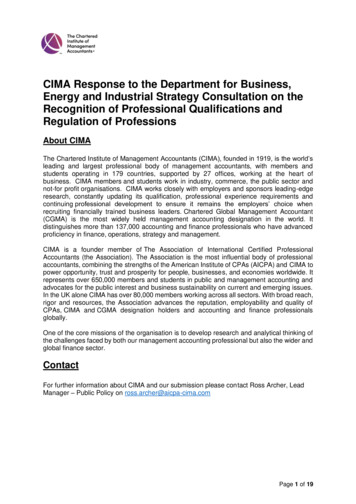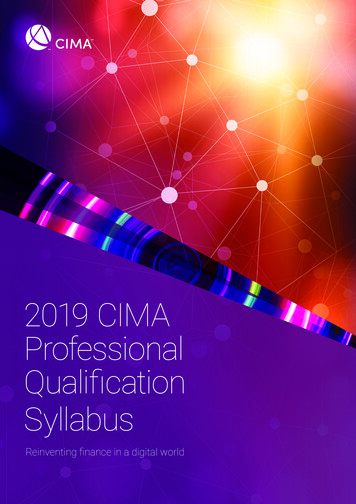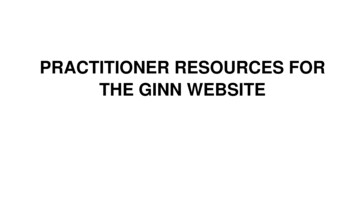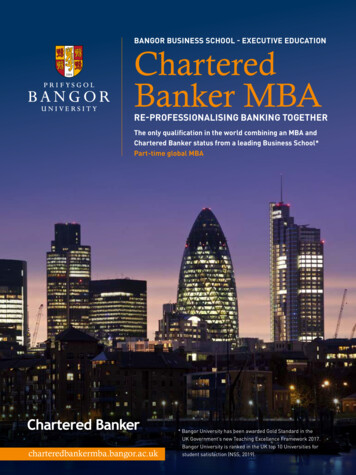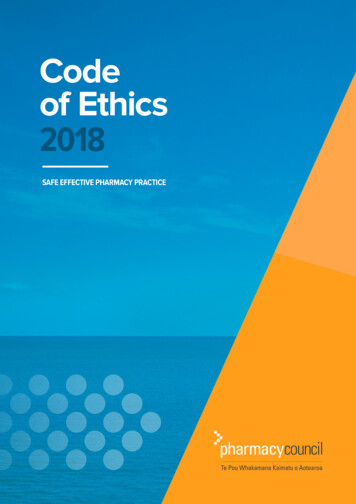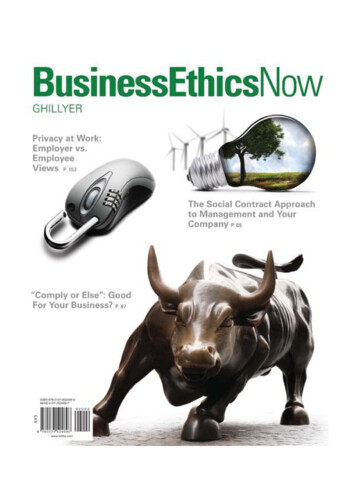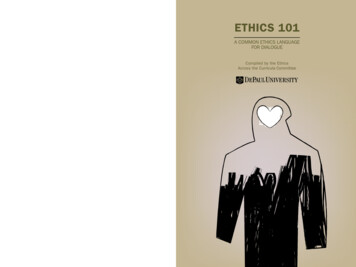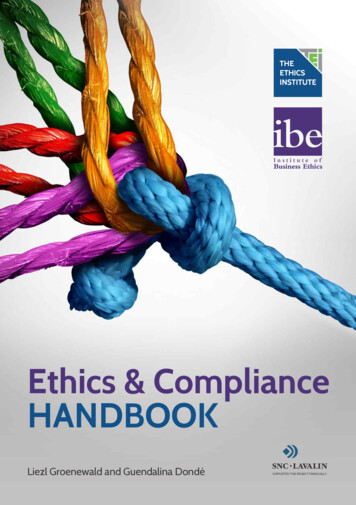
Transcription
CIMA CODE OF ETHICSFOR PROFESSIONAL ACCOUNTANTSJANUARY 2015
02CIMA code of ethics for professional accountantsCIMA PREFACElAs chartered management accountants CIMA members (and registeredstudents) throughout the world have a duty to observe the highest standardsof conduct and integrity, and to uphold the good standing and reputationof the profession. They must also refrain from any conduct which mightdiscredit the profession. Members and registered students must have regardto these guidelines irrespective of their field of activity, of their contractof employment or of any other professional memberships they may hold.CIMA upholds the aims and principles of equal opportunities and fundamental human rights worldwide, including the handling of personal information. The Institute promotes the highest ethical andbusiness standards, and encourages its members to be good and responsible professionals. Good ethicalbehaviour may be above that required by the law. In a highly competitive, complex business world, it isessential that CIMA members sustain their integrity and remember the trust and confidence which isplaced on them by whoever relies on their objectivity and professionalism. Members must avoid actionsor situations which are inconsistent with their professional obligations. They should also be guided notmerely by the terms but by the spirit of this Code.CIMA members should conduct themselves with courtesy and consideration towards all with whomthey have professional dealings and should not behave in a manner which could be considered offensiveor discriminatory.To ensure that CIMA members protect the good standing and reputation of the profession, membersmust report the fact to the Institute if they are convicted or disqualified from acting as an officer ofa company or if they are subject to any sanction resulting from disciplinary action taken by any otherbody or authority.CIMA has adopted the following code of ethics. Parts A and B of this code are based on the IFAC* Codeof Ethics, that was developed with the help of input from CIMA and the global accountancy profession.Part C of the Code was developed in cooperation with the American Institute of Certified PublicAccountants (AICPA).The AICPA and CIMA joined together to create a designation for managementaccountants, the Chartered Global Management Accountant (CGMA). The CGMA designation is designedto elevate management accounting and further emphasize its importance for businesses worldwide. PartC of the Code is designed to provide guidance to all CIMA members around the world who are membersin business and professional accountants in business and, those who hold the CGMA credential. When aCGMA is also a member in public practice the CGMA should also comply with the applicable guidanceof the CIMA Code of Ethics and apply the most restrictive provisions.If a member cannot resolve an ethical issue by following this Code by consulting the ethics informationon CIMA’s website or by seeking guidance from CIMA’s ethics helpline, he or she should seek legal adviceas to both his or her legal rights and any obligations he or she may have. The CIMA Charter, Byelaws andRegulations give definitive rules on many matters.For further information see: www.cimaglobal.com/ethicsNote: The CIMA Code of Ethics is a Law of the Institute (to which all members and registered studentsare required to comply) for the purpose of the definition of “misconduct” in Byelaw 1.*International Federation of Accountants.Parts A and B of the CIMA Code of Ethics are based on the IFAC Handbook of the Code of Ethicsfor Professional Accountants, of the International Ethics Standards Board of Accountants (IESBA),published by IFAC in July 2014 and is used with permission by IFAC.
03CIMA code of ethics for professional accountantsCIMA CODE at a glancelPart A: General application of the CodePart A establishes the fundamental principles of professionalethics for professional accountants. It also provides a conceptualframework that they shall use to identify, evaluate and applysafeguards to eliminate threats to compliance with thefundamental principles.Part A addresses conflicts of interest (100.17), ethical conflictresolution (100.19-100.24), and communicating with thosecharged with governance (100.25). The five fundamentalprinciples listed in Part A are Integrity (110), Objectivity (120),Professional Competence and Due Care (130), Confidentiality(140), and Professional Behaviour (150).Part B: Professional Accountants in Public PracticePart B applies to professional accountants in public practice,and describes how the conceptual framework applies incertain situations. It provides examples of safeguards thatmay be appropriate to address threats to compliance withthe fundamental principles. It also describes situations wheresafeguards are not available to address the threats, andconsequently, the circumstance or relationship creating thethreats shall be avoided. Professional accountants in publicpractice may also find Part C relevant to their particularcircumstances.Part B addresses professional appointments (210), includingclient and engagement acceptance, and changes in aprofessional appointment. This is followed by section 220on conflicts of interest, second opinions (230), fees and othertypes of remuneration (240), marketing and professional services(250), gifts and hospitality (260), custody of client assets (270),and objectivity – all services (280).Sections 290 and 291 (in Annex 1 – separate document)address the independence requirements for audit, reviewand other assurance engagements and apply a conceptualframework approach.Part C: Professional Accountants in Businessincluding CGMA designation holdersPart C applies to professional accountants in business, anddescribes how the conceptual framework applies in certainsituations. Part C of the Code was developed in cooperationwith the American Institute of Certified Public Accountants(AICPA); and, like Parts A and B, the elements of the updatedPart C which apply to CIMA members and students continueto reflect IFAC’s fundamental principles and conceptualframework approach.Part C section 310 addresses ethical conflicts, and includesan interpretation under CIMA’s Integrity and ObjectivityPrinciples, and AICPA’s Integrity and Objectivity Rule. Section320 addresses conflicts of interest, including how they areidentified, evaluated and disclosed of. Offering or acceptinggifts, entertainment and other forms of inducements arefound in section 330. Preparing and reporting information(340) is addressed with subheadings including “knowingmisrepresentations in the preparation of financial statementsor records”, “subordination of judgment”, and “obligation ofa member to his or her employer’s external accountant”.Information related to educational services can be found insection 350. Section 360 highlights the principle of ProfessionalCompetence and Due Care and AICPA’s General StandardsRule, and includes information around submission of financialstatements, accounting principles, and responsibility foraffirming that financial statements are in conformity withthe applicable financial reporting framework.CIMA’s Professional Behaviour and Confidentiality Principles,and AICPA’s Acts Discreditable Rule are addressed in section 370,with subheadings including “discrimination and harassment inemployment practices”, “solicitation or disclosure of CPA/CIMAexamination questions and answers”, “failure to file a tax returnor pay a tax liability”, “negligence in the preparation of financialstatements or records”, “governmental bodies, commissions, orother regulatory agencies”, “indemnification and limitation ofliability provisions”, “confidential information obtained fromemployment or volunteer activities”, and “false, misleading ordeceptive acts in promoting or marketing professional services”.
04CIMA code of ethics for professional accountantsCONCEPTUAL FRAMEWORK APPROACHThreatsThe Code establishes a conceptual framework that requiresa professional accountant to identify, evaluate, and addressthreats to compliance with the fundamental principles. Theconceptual framework approach assists professional accountantsin complying with the ethical requirements of this Code andmeeting their responsibility to act in the public interest.The code identifies five categories of common threats to thefive principles:Fundamental principlesCIMA’s Code of Ethics is made up of five fundamental principles: Integrity: being straightforward, honest and truthful in allprofessional and business relationships. You should not beassociated with any information that you believe containsa materially false or misleading statement, or which ismisleading by omission. Self-interest threat: commonly called a “conflict of interest”which may inappropriately influence judgment or behaviour. Self-review threat: when you are required to evaluate theresults of a previous judgment or service. Advocacy threat: arising if promoting a position oropinion to the point that your subsequent objectivity iscompromised. Familiarity threat: when you become so sympathetic tothe interests of others as a result of a close relationshipthat your professional judgment becomes compromised. Objectivity: not allowing bias, conflict of interest or theinfluence of other people to override your professionaljudgment. Intimidation threat: when you are deterred from actingobjectively by actual or perceived pressure or influence. Professional competence and due care: an ongoingcommitment to your level of professional knowledge andskill. Base this on current developments in practice, legislationand techniques. Those working under your authority mustalso have the appropriate training and supervision.Safeguards Confidentiality: you should not disclose professionalinformation unless you have specific permission or alegal or professional duty to do so. Professional behaviour: comply with relevant laws andregulations. You must also avoid any action that couldnegatively affect the reputation of the profession.The code explains these principles, and gives examplesof their use for professional accountants in practice (Part B)and professional accountants in business (Part C).Our code has a “threats and safeguards” approach to resolvingethical issues. This means that if you think there is a threat,you should assess whether the threat is significant. Then, takeaction to remove or mitigate it.Employing institutions often have safeguards: whistleblowingor grievance procedures. Safeguards are also created by theprofession, legislation or regulation.
05CIMA code of ethics for professional accountantsCONtentslCIMA PREFACE02CIMA CODE AT A GLANCE03PART AGENERAL APPLICATION OF THE CODE07100Introduction and Fundamental ssional Competence and Due Care12140Confidentiality13150Professional Behaviour14PART BPROFESSIONAL ACCOUNTANTS IN PUBLIC PRACTICE15200Introduction16210Professional Appointment19220Conflicts of Interest21230Second Opinions24240Fees and Other Types of Remuneration25250Marketing Professional Services26260Gifts and Hospitality26270Custody of Client Assets27280Objectivity – All Services27290Independence – Audit and Review Engagement (Annex 1 – separate document)291Independence – Other Assurance Engagements (Annex 1 – separate document)
06CIMA code of ethics for professional accountantsCONtentslPART CPROFESSIONAL ACCOUNTANTS IN BUSINESS(INCLUDING CGMA DESIGNATION HOLDERS)29300Introduction30310Ethical Conflicts34320Conflicts of Interest35330Gifts, Entertainment and Other Forms of Inducements37340Preparing and Reporting Information38350Educational Services40360General Standards/Professional Competence and Due Care40370Acts Discreditable/Professional Behaviour/Confidentiality45DEFINITIONS (PARTS A AND B)49DEFINITIONS (PART C)54INDEX56ANNEX 1 – separate document290Independence – Audit and Review Engagement291Independence – Other Assurance Engagements
07CIMA code of ethics for professional accountantsPART AGENERAL APPLICATION OF THE CODE100Introduction and Fundamental ssional Competence and Due Care12140Confidentiality13150Professional Behaviour14
08CIMA code of ethics for professional accountantsSECTION 100lIntroduction and Fundamental Principles100.1 A distinguishing mark of the accountancy professionis its acceptance of the responsibility to act in thepublic interest. Therefore, a professional accountant’sresponsibility is not exclusively to satisfy the needs ofan individual client or employer. In acting in the publicinterest, a professional accountant shall observe andcomply with this Code. If a professional accountant isprohibited from complying with certain parts of thisCode by law or regulation, the professional accountantshall comply with all other parts of this Code.100.2 This Code contains three parts. Part A establishesthe fundamental principles of professional ethics forprofessional accountants and provides a conceptualframework that professional accountants shall apply to:(a) Identify threats to compliance with thefundamental principles;(b) Evaluate the significance of the threats identified;and(c) Apply safeguards, when necessary, to eliminatethe threats or reduce them to an acceptable level.Safeguards are necessary when the professionalaccountant determines that the threats are not at alevel at which a reasonable and informed third partywould be likely to conclude, weighing all the specificfacts and circumstances available to the professionalaccountant at that time, that compliance with thefundamental principles is not compromised.A professional accountant shall use professionaljudgment in applying this conceptual framework.100.3 Parts B and C describe how the conceptual frameworkapplies in certain situations. They provide examples ofsafeguards that may be appropriate to address threatsto compliance with the fundamental principles. Theyalso describe situations where safeguards are notavailable to address the threats, and consequently, thecircumstance or relationship creating the threats shallbe avoided. Part B applies to professional accountantsin public practice. Part C applies to professionalaccountants in business. Professional accountants inpublic practice may also find Part C relevant to theirparticular circumstances.100.4 The use of the word “shall” in this Code imposes arequirement on the professional accountant or firm tocomply with the specific provision in which “shall” hasbeen used. Compliance is required unless an exceptionis permitted by this Code.Fundamental Principles100.5 A professional accountant shall comply with thefollowing fundamental principles:(a) Integrity – to be straightforward and honest inall professional and business relationships.(b) Objectivity – to not allow bias, conflict of interestor undue influence of others to override professionalor business judgments.(c) Professional Competence and Due Care – tomaintain professional knowledge and skill at the levelrequired to ensure that a client or employer receivescompetent professional service based on currentdevelopments in practice, legislation and techniquesand act diligently and in accordance with applicabletechnical and professional standards.(d) Confidentiality – to respect the confidentiality ofinformation acquired as a result of professional andbusiness relationships and, therefore, not disclose anysuch information to third parties without proper andspecific authority, unless there is a legal or professionalright or duty to disclose, nor use the information forthe personal advantage of the professional accountantor third parties.(e) Professional Behavior – to comply with relevantlaws and regulations and avoid any action thatdiscredits the profession.Each of these fundamental principles is discussed inmore detail in Sections 110–150.
09CIMA code of ethics for professional accountantsConceptual Framework Approach100.6 The circumstances in which professional accountantsoperate may create specific threats to compliance withthe fundamental principles. It is impossible to defineevery situation that creates threats to compliance withthe fundamental principles and specify the appropriateaction. In addition, the nature of engagements andwork assignments may differ and, consequently,different threats may be created, requiring theapplication of different safeguards. Therefore, thisCode establishes a conceptual framework that requiresa professional accountant to identify, evaluate, andaddress threats to compliance with the fundamentalprinciples. The conceptual framework approachassists professional accountants in complying withthe ethical requirements of this Code and meetingtheir responsibility to act in the public interest.It accommodates many variations in circumstancesthat create threats to compliance with the fundamentalprinciples and can deter a professional accountant fromconcluding that a situation is permitted if it is notspecifically prohibited.100.7 When a professional accountant identifies threatsto compliance with the fundamental principles and,based on an evaluation of those threats, determinesthat they are not at an acceptable level, theprofessional accountant shall determine whetherappropriate safeguards are available and can beapplied to eliminate the threats or reduce them to anacceptable level. In making that determination, theprofessional accountant shall exercise professionaljudgment and take into account whether a reasonableand informed third party, weighing all the specificfacts and circumstances available to the professionalaccountant at the time, would be likely to concludethat the threats would be eliminated or reduced to anacceptable level by the application of the safeguards,such that compliance with the fundamental principlesis not compromised.100.8 A professional accountant shall evaluate any threatsto compliance with the fundamental principleswhen the professional accountant knows, or couldreasonably be expected to know, of circumstances orrelationships that may compromise compliance withthe fundamental principles.100.9 A professional accountant shall take qualitative as wellas quantitative factors into account when evaluating thesignificance of a threat. When applying the conceptualframework, a professional accountant may encountersituations in which threats cannot be eliminated orreduced to an acceptable level, either because the threatis too significant or because appropriate safeguards arenot available or cannot be applied. In such situations,the professional accountant shall decline or discontinuethe specific professional activity or service involved or,when necessary, resign from the engagement (in thecase of a professional accountant in public practice) orthe employing organization (in the case of a professionalaccountant in business).100.10 Sections 290 and 291 contain provisions withwhich a professional accountant shall comply if theprofessional accountant identifies a breach of anindependence provision of the Code. If a professionalaccountant identifies a breach of any other provisionof the Code, the professional accountant shall evaluatethe significance of the breach and the impact of theaccountant’s ability to comply with the fundamentalprinciples. The accountant shall take whateveractions that may be available, as soon as possible, tosatisfactorily address the consequences of the breach.The accountant shall determine whether to reportthe breach, for example, to those who may havebeen affected by the breach, a member body,relevant regulator or oversight authority.100.11 When a professional accountant encountersunusual circumstances in which the application ofa specific requirement of the Code would result in adisproportionate outcome or an outcome that maynot be in the public interest, it is recommended thatthe professional accountant consult with a memberbody or the relevant regulator.
10CIMA code of ethics for professional accountantsThreats and Safeguards100.12 Threats may be created by a broad range ofrelationships and circumstances. When a relationshipor circumstance creates a threat, such a threat couldcompromise, or could be perceived to compromise,a professional accountant’s compliance with thefundamental principles. A circumstance or relationshipmay create more than one threat, and a threat mayaffect compliance with more than one fundamentalprinciple. Threats fall into one or more of the followingcategories:(a) Self-interest threat – the threat that a financialor other interest will inappropriately influence theprofessional accountant’s judgment or behavior;(b) Self-review threat – the threat that a professionalaccountant will not appropriately evaluate the resultsof a previous judgment made or activity or serviceperformed by the professional accountant, or by anotherindividual within the professional accountant’s firm oremploying organization, on which the accountant willrely when forming a judgment as part of performinga current activity or providing a current service;(c) Advocacy threat – the threat that a professionalaccountant will promote a client’s or employer’sposition to the point that the professional accountant’sobjectivity is compromised;(d) Familiarity threat – the threat that due to a longor close relationship with a client or employer, aprofessional accountant will be too sympathetic totheir interests or too accepting of their work; and(e) Intimidation threat – the threat that aprofessional accountant will be deterred fromacting objectively because of actual or perceivedpressures, including attempts to exercise undueinfluence over the professional accountant.Parts B and C of this Code explain how thesecategories of threats may be created for professionalaccountants in public practice and professionalaccountants in business, respectively. Professionalaccountants in public practice may also find Part Crelevant to their particular circumstances.100.13 Safeguards are actions or other measures that mayeliminate threats or reduce them to an acceptablelevel. They fall into two broad categories:(a) Safeguards created by the profession, legislationor regulation; and(b) Safeguards in the work environment.100.14 Safeguards created by the profession, legislation orregulation include: Educational, training and experience requirementsfor entry into the profession. Continuing professional development requirements. Corporate governance regulations. Professional standards. Professional or regulatory monitoring and disciplinaryprocedures. External review by a legally empowered third party ofthe reports, returns, communications or informationproduced by a professional accountant.100.15 Parts B and C of this Code discuss safeguards inthe work environment for professional accountantsin public practice and professional accountants inbusiness, respectively.100.16 Certain safeguards may increase the likelihood ofidentifying or deterring unethical behavior. Suchsafeguards, which may be created by the accountingprofession, legislation, regulation, or an employingorganization, include: Effective, well-publicized complaint systems operatedby the employing organization, the profession ora regulator, which enable colleagues, employersand members of the public to draw attention tounprofessional or unethical behavior. An explicitly stated duty to report breaches ofethical requirements.
11CIMA code of ethics for professional accountantsConflicts of Interest100.17 A professional accountant may be faced with a conflictof interest when undertaking a professional activity.A conflict of interest creates a threat to objectivityand may create threats to the other fundamentalprinciples. Such threats may be created when: The professional accountant undertakes a professionalactivity related to a particular matter for two or moreparties whose interest with respect to that matter arein conflict; or The interests of the professional accountant withrespect to a particular matter and the interestsof a party for whom the professional accountantprovides a professional activity related to thatmatter are in conflict.100.18 Parts B and C of this Code discuss conflicts of interestfor professional accountants in public practice andprofessional accountants in business, respectively.Ethical Conflict Resolution100.19 A professional accountant may be required to resolve aconflict in complying with the fundamental principles.100.20 When initiating either a formal or informal conflictresolution process, the following factors, eitherindividually or together with other factors, maybe relevant to the resolution process:(a) Relevant facts;(b) Ethical issues involved;(c) Fundamental principles related to the matterin question;(d) Established internal procedures; and(e) Alternative courses of action.Having considered the relevant factors, a professionalaccountant shall determine the appropriate course ofaction, weighing the consequences of each possiblecourse of action. If the matter remains unresolved,the professional accountant may wish to consult withother appropriate persons within the firm or employingorganization for help in obtaining resolution.100.21 Where a matter involves a conflict with, or within,an organization, a professional accountant shalldetermine whether to consult with those chargedwith governance of the organization, such as theboard of directors or the audit committee.100.22 It may be in the best interests of the professionalaccountant to document the substance of the issue,the details of any discussions held, and the decisionsmade concerning that issue.100.23 If a significant conflict cannot be resolved, aprofessional accountant may consider obtainingprofessional advice from the relevant professional bodyor from legal advisors. The professional accountantgenerally can obtain guidance on ethical issues withoutbreaching the fundamental principle of confidentialityif the matter is discussed with the relevant professionalbody on an anonymous basis or with a legal advisorunder the protection of legal privilege. Instances inwhich the professional accountant may considerobtaining legal advice vary. For example, a professionalaccountant may have encountered a fraud, thereporting of which could breach the professionalaccountant’s responsibility to respect confidentiality.The professional accountant may consider obtaininglegal advice in that instance to determine whetherthere is a requirement to report.100.24 If, after exhausting all relevant possibilities, theethical conflict remains unresolved, a professionalaccountant shall, where possible, refuse to remainassociated with the matter creating the conflict.The professional accountant shall determine whether,in the circumstances, it is appropriate to withdrawfrom the engagement team or specific assignment,or to resign altogether from the engagement, thefirm or the employing organization.
12CIMA code of ethics for professional accountantsCommunicating with ThoseCharged with Governance100.25 When communicating with those charged withgovernance in accordance with the provisions of thisCode, the professional accountant or firm shall determine,having regard to the nature and importance of theparticular circumstances and matter to be communicated,the appropriate person(s) within the entity’s governancestructure with whom to communicate. If the professionalaccountant or firm communicates with a subgroup ofthose charged with governance, for example, an auditcommittee or an individual, the professional accountantor firm shall determine whether communication with allof those charged with governance is also necessary sothat they are adequately informed.SECTION 120lObjectivity120.1 The principle of objectivity imposes an obligation onall professional accountants not to compromise theirprofessional or business judgment because of bias,conflict of interest or the undue influence of others.120.2 A professional accountant may be exposedto situations that may impair objectivity. It isimpracticable to define and prescribe all suchsituations. A professional accountant shall not performa professional service if a circumstance or relationshipbiases or unduly influences the accountant’sprofessional judgment with respect to that service.SECTION 110lSECTION 130lIntegrity110.1 The principle of integrity imposes an obligation on allprofessional accountants to be straightforward andhonest in all professional and business relationships.Integrity also implies fair dealing and truthfulness.110.2 A professional accountant shall not knowingly beassociated with reports, returns, communications orother information where the professional accountantbelieves that the information:(a) Contains a materially false or misleadingstatement;(b) Contains statements or information furnishedrecklessly; or(c) Omits or obscures information required to beincluded where such omission or obscurity wouldbe misleading.When a professional accountant becomes awarethat the accountant has been associated with suchinformation, the accountant shall take steps to bedisassociated from that information.110.3 A professional accountant will be deemed not tobe in breach of paragraph 110.2 if the professionalaccountant provides a modified report in respectof a matter contained in paragraph 110.2.Professional Competence and Due Care130.1 The principle of professional competence and duecare imposes the following obligations on allprofessional accountants:(a) To maintain professional knowledge and skill atthe level required to ensure that clients or employersreceive competent professional service; and(b) To act diligently in accordance with applicabletechnical and professional standards whenperforming professional activities or providingprofessional services.130.2 Competent professional service requires theexercise of sound judgment in applying professionalknowledge and skill in the performance of such serv
accountants, the Chartered Global Management Accountant (CGMA). The CGMA designation is designed to elevate management accounting and further emphasize its importance for businesses worldwide. Part C of the Code is designed to provide guidance to all CIMA members around the world who are members
